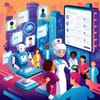Artificial intelligence (AI) is revolutionizing the healthcare industry by improving diagnostic accuracy, streamlining clinical workflows, and enhancing patient care. The UK's National Health Service (NHS) has been at the forefront of adopting AI technologies to tackle various healthcare challenges.
AI-powered diagnostic tools are being used to detect diseases such as lung cancer and cardiovascular conditions. For instance, AI algorithms can analyze medical images to identify potential health issues, enabling early interventions and better patient outcomes. A recent study found that AI-assisted chest X-rays can help doctors prioritize critical cases and improve diagnosis accuracy.
AI is also being used to automate administrative tasks, freeing up clinicians to focus on patient care. Virtual health assistants and chatbots are being deployed to provide patients with personalized support and education, reducing the burden on healthcare professionals. TORTUS AI, a UK-based startup, has developed an ambient voice technology that generates draft clinical notes during consultations, saving clinicians time and improving productivity.
AI-powered physiotherapy platforms, such as Flok Health, offer immediate, personalized care to patients, reducing wait times and improving health outcomes. The platform uses AI to analyze patient data and provide tailored exercises and pain management routines, enabling patients to access care immediately.
While AI has the potential to transform healthcare, there are challenges to be addressed, including integrating AI with existing IT systems, ensuring data privacy and security, and providing adequate training for healthcare professionals. Despite these challenges, the benefits of AI in healthcare are undeniable, and its adoption is expected to continue growing in the coming years.
Studies have shown that AI-powered solutions can have a significant impact on healthcare outcomes. For example, a trial of TORTUS AI found that clinicians saw 13% more patients per shift in A&E departments, with 92% of patients happy to give consent for AI-powered consultations. Economic modeling suggests that TORTUS AI could save £176 million in documentation time and unlock £650 million in extra clinical.


